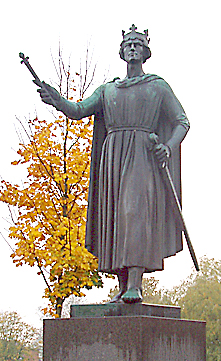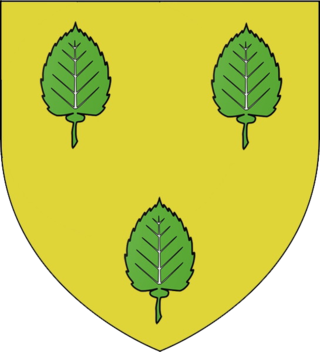See also
- Orrm, author of the Ormulum , a 12th-century Christian text
- Orm, who commissioned the Kirkdale sundial in 11th century England
- Orme (name)
Orm is a given name usually of Scandinavian origin.
People with the given name include:
Bradley is an English surname derived from a placename meaning "broad wood" or "broad meadow" in Old English.

Waldemar, Valdemar or Woldemar is an Old High German given name. It consists of the elements wald- "power", "brightness" and -mar "fame".
Orrm, OSA, also known as Orrmin, was an Augustinian canon from south Lincolnshire who wrote the Ormulum, a collection of verse homilies that is the oldest English autograph and one of the most significant records of Middle English. His work is a successful example of homiletics translating Latin learning to balance the needs of his fellow canons, who likely spoke Anglo-Norman French, with those of lay English-speaking audiences.
Orm became an Anglo-Saxon personal name during period of the Danelaw.
Thierry is a French male given name, derived from the Germanic "Theodoric". It is the cognate of German "Dietrich" and "Dieter", English Terry, Italian Teodorico, Derek and Derrick, and of various forms in other European languages. It is also a surname.
Rhys or Rhŷs is a popular Welsh given name that is famous in Welsh history and is also used as a surname. It originates from Deheubarth, an old region of South West Wales, with famous kings such as Rhys ap Tewdwr.
Ingrid is a feminine given name. It continues the Old Norse name Ingiríðr, which was a short form of Ingfríðr, composed of the theonym Ing and the element fríðr "beloved; beautiful" common in Germanic feminine given names. The name Ingrid remains widely given in all of Scandinavia, with the highest frequency in Norway. Norwegian usage peaked in the interbellum period, with more than 2% of newborn girls so named in 1920; popularity declined gradually over the 1930s to 1960s, but picked up again in the late 1970s, peaking above 1.5% in the 1990s.
Mac Diarmada, also spelled Mac Diarmata, is an Irish surname, and the surname of the ruling dynasty of Moylurg, a kingdom that existed in Connacht from the 10th to 16th centuries. The last ruling king was Tadhg mac Diarmata, who ruled until 1585.
John Reid may refer to:
Delaney is an Irish surname derived from the Gaelic Ó Dubhshláine, Dubh meaning black and Sláine for the River Sláine (Slaney). DeLaney is also of Norman origin. Variants include Delaney, Delany and Dulaney.

O'Cleary or O'Clery is the surname of a learned Gaelic Irish family. It is the oldest recorded surname in Europe — dating back to 916 AD — and is cognate with cleric and clerk. The O'Clearys are a sept of the Uí Fiachrach dynasty, who ruled the Kingdom of Connacht for nearly two millennia. As Connachta, the O'Cleary's ruled the kingdom of Uí Fiachrach Aidhne for nearly 800 years. They are the descendants of Fiachrae, son of the High King Eochaid Mugmedon, and elder brother of legendary High King Niall of the Nine Hostages. According to legend, they ultimately trace their ancestry back to the mythical Fir Bolg, as well as to Milesius, and consequently to Japheth, son of Noah.
Graham is a surname of Scottish and English origin. It is typically an Anglo-French form of the name of the town of Grantham, in Lincolnshire, England. The settlement is recorded in the 11th century Domesday Book variously as Grantham, Grandham, Granham and Graham. This place name is thought to be derived from the Old English elements grand, possibly meaning "gravel", and ham, meaning "hamlet" the English word given to small settlements of smaller size than villages.
Buckley is a surname originating from either Ireland or England where it is particularly common, as well as Canada and the United States.
Adamson is an English patronymic surname meaning "son of Adam". It is rare as a given name, although there has been a tradition in some families for the first-born son to be called Adam. People with the surname Adamson include:
Eriksen is a common Danish and Norwegian patronymic surname meaning "son of Erik", itself an Old Norse given name. The spelling forms Ericksen, Erichsen, Ericson, Erikzen, are cognates. People with the surname Eriksen and its cognates include:
Norman is both a surname and a given name. The surname has multiple origins including English, Irish, Scottish, German, French, Norwegian, Ashkenazi Jewish, and Jewish American. The given name Norman is mostly of English origin, though in some cases it can be an Anglicised form of a Scottish Gaelic personal name.

Twomey is an Irish Gaelic clan based most prominently in what is today County Cork. The paternal ancestors of the clan are of the Corcu Loígde; the Twomey clan originated from Donnchadh na Tuaima who was himself a member of the O'Leary family. The Twomey family motto is "fortis undis et armis" which translates to 'strong waves and arms'.
Alwyn is a name, primarily used as a given name.
Jørn or Jorn is a given name. Notable people with the name include:

Gordon is a masculine given name in the English language. The name is derived from the Scottish surname Gordon. It is uncertain if this surname originated from a place name in Scotland or in France. The Gordon in Berwickshire, where the family who bore the surname held lands in the 12th century, is of uncertain etymology. It is also possible that this place name was named after settlers from France, who were named after a like-named place in Normandy. The surname is thought to have been taken up as a given name in honour of the Major-General Charles George Gordon, a British army officer who was killed in 1885, in Khartoum.